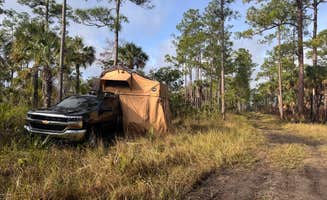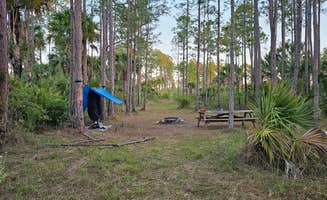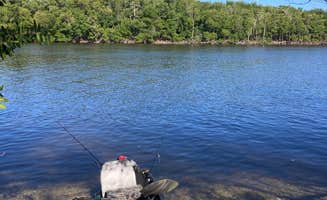Primitive camping near Bonita Springs, Florida centers around the Big Cypress National Preserve ecosystem where marshlands meet pine forests. Campsites range from 5 to 15 miles inland from the Gulf Coast, creating a distinct subtropical wilderness experience within driving distance of urban areas. The region experiences significant seasonal fluctuations, with dry season (November through April) offering more accessible conditions and lower insect populations.
What to do
Wildlife observation opportunities: At Panther Camp in Big Cypress National Preserve, visitors can monitor the water hole behind camp for wildlife. A camper notes, "There is a water hole in the back of the camp which can be filtered. However a gator generally lives there." The camp's location offers potential sightings of Florida panthers, though these endangered cats remain elusive.
Water-based exploration: The Backcountry Crooked Creek Chickee in Everglades National Park serves as a paddling destination for anglers. A visitor reports, "Fishing is epic, even from the chickee. Stay quiet and look under the platform, tarpon, snook and drum were always around." Tidal currents affect paddling difficulty, requiring careful planning.
Backcountry hiking: The network of trails connecting primitive campsites provides multi-day hiking opportunities. Many trails follow old logging roads and require navigation skills. Seasonal flooding can transform dry paths into muddy stretches or standing water crossings, particularly during summer months.
What campers like
Remote setting: The isolation at Nobles Primitive Camp appeals to campers seeking solitude. One visitor describes the approach as a "Great remote drive out to the primitive site 'old Florida' the paved road turns to dirt/gravel. One way in one way out."
Communication access: Despite wilderness settings, some sites maintain connectivity. A camper at Panther Camp observed "Strong cell signal due to cell towers at the rest stop," making it suitable for those needing emergency contact options.
Cost-effective camping: Free camping opportunities throughout Big Cypress National Preserve provide budget-friendly options. A Panther Camp visitor confirmed, "There is no cost to stay, no reservations needed. You can fill out a permit from the website." Most primitive sites require only self-registration permits rather than fees.
What you should know
Permit requirements: All overnight stays in Carpenter Primitive Camp and other Big Cypress primitive sites require backcountry permits, available through the preserve's website or visitor centers. These free permits help rangers track usage and maintain site conditions.
Seasonal conditions: Water levels fluctuate dramatically between wet season (May through October) and dry season. Summer brings daily thunderstorms, high humidity, and substantial mosquito populations. Winter camping offers more comfortable temperatures and significantly reduced insect activity.
Limited facilities: No potable water exists at primitive sites, requiring visitors to carry all drinking water or reliable filtration systems. Campers must pack out all waste, including human waste in some areas where catholes are prohibited due to high water tables.
Tips for camping with families
Wildlife safety protocols: Establish clear boundaries for children around water sources where alligators may be present. Food storage requires careful attention to prevent raccoon encounters and reduce insect attraction around sleeping areas.
Distance considerations: The 5-mile hike to Ivy Primitive Camp may challenge younger children. Plan for slower hiking speeds and additional rest stops when backpacking with families. Winter months provide more comfortable hiking temperatures for children.
Communication preparations: Cell service varies significantly throughout the preserve. Many primitive sites lack reliable communication options, requiring family groups to establish emergency plans before departing. Satellite communication devices provide backup options in areas without cellular coverage.
Tips from RVers
Access limitations: The unpaved roads to primitive camping areas frequently become impassable for conventional RVs. A visitor to Nobles Primitive Camp shared, "Luckily the access road was drivable with two wheel drive," but road conditions change seasonally.
Alternative options: RV campers seeking primitive experiences can utilize developed campgrounds as base camps for day hikes to remote areas. The Mile Marker 70 campground on US-41 provides RV access while allowing exploration of surrounding backcountry areas.
Weather monitoring: Florida's rapid weather changes require consistent forecasting checks. Summer afternoon thunderstorms develop quickly, making morning activities safer. Hurricane season (June through November) necessitates evacuation plans for all campers, particularly those with vehicles in remote locations.




